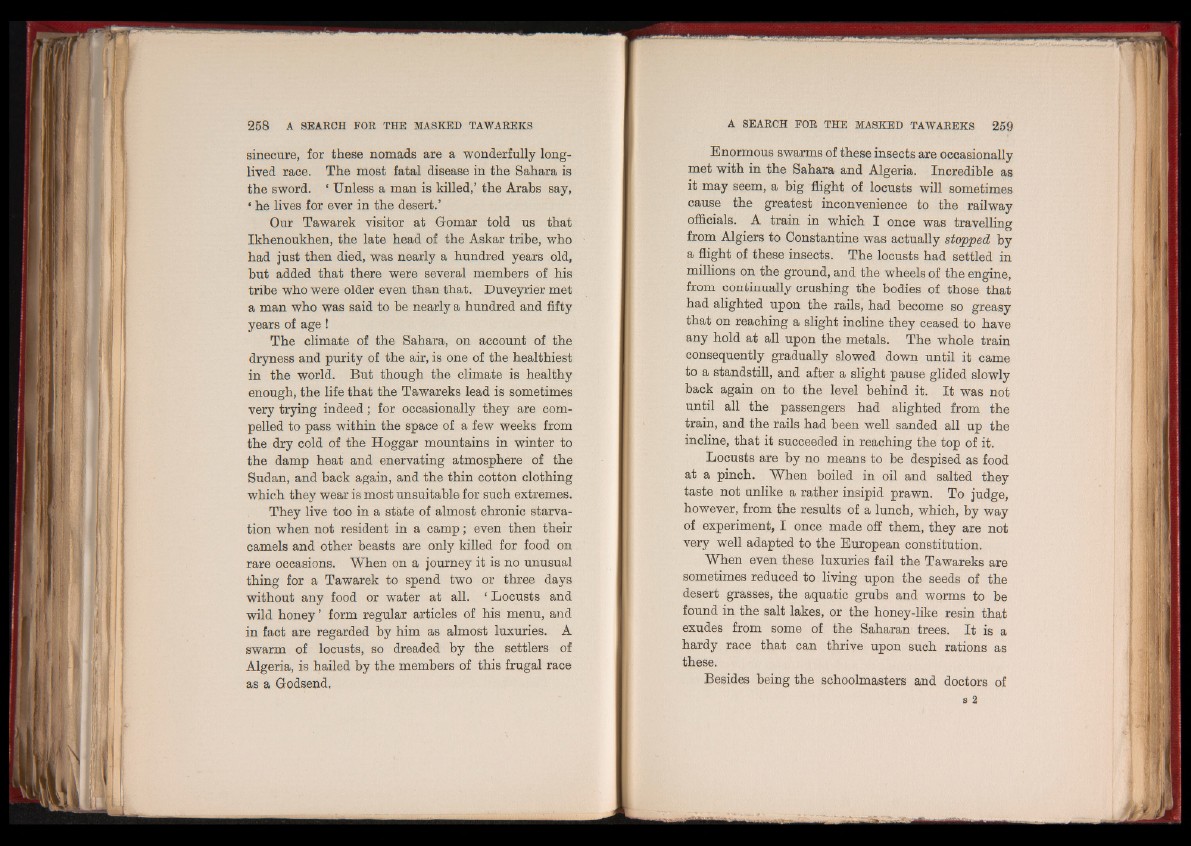
sinecure, for these nomads are a wonderfully long-
lived race. The most fatal disease in the Sahara is
the sword. ‘ Unless a man is killed,’ the Arabs say,
* he lives for ever in the desert.’
Our Tawarek visitor at Gomar told us that
Ikhenoukhen, the late head of the Askar tribe, who
had just then died, was nearly a hundred years old,
but added that there were several members of his
tribe who were older even than that. Duveyrier met
a man who was said to be nearly a hundred and fifty
years of age!
The climate of the Sahara, on account of the
dryness and purity of the air, is one of the healthiest
in the world. But though the climate is healthy
enough, the life that the Tawareks lead is sometimes
very trying indeed; for occasionally they are compelled
to pass within the space of a few weeks from
the dry cold of the Hoggar mountains in winter to
the damp heat and enervating atmosphere of the
Sudan, and back again, and the thin cotton clothing
which they wear is most unsuitable for such extremes.
They live too in a state of almost chronic starvation
when not resident in a camp; even then their
camels and other beasts are only killed for food on
rare occasions. When on a journey it is no unusual
thing for a Tawarek to spend two or three days
without any food or water at all. ‘ Locusts and
wild honey ’ form regular articles of his menu, and
in fact are regarded by him as almost luxuries. A
swarm of locusts, so dreaded by the settlers of
Algeria, is hailed by the members of this frugal race
as a Godsend,
Enormous swarms of these insects are occasionally
met with in the Sahara and Algeria. Incredible as
it may seem, a big flight of locusts will sometimes
cause the greatest inconvenience to the railway
officials. A train in which I once was travelling
from Algiers to Constantine was actually stopped by
a flight of these insects. The locusts had settled in
millions on the ground, and the wheels of the engine,
from continually crushing the bodies of those that
had alighted upon the rails, had become so greasy
that on reaching a slight incline they ceased to have
any hold at all upon the metals. The whole train
consequently gradually slowed down until it came
to a standstill, and after a slight pause glided slowly
back again on to the level behind it. It was not
until all the passengers had alighted from the
train, and the rails had been well sanded all up the
incline, that it succeeded in reaching the top of it.
Locusts are by no means to be despised as food
at a pinch. When boiled in oil and salted they
taste not unlike a rather insipid prawn. To judge,
however, from the results of a lunch, which, by way
of experiment, I once made off them, they are not
very well adapted to the European constitution.
When even these luxuries fail the Tawareks are
sometimes reduced to living upon the seeds of the
desert grasses, the aquatic grubs and worms to be
found in the salt lakes, or the honey-like resin that
exudes from some of the Saharan trees. It is a
hardy race that can thrive upon such rations as
these.
Besides being the schoolmasters and doctors of
s 2